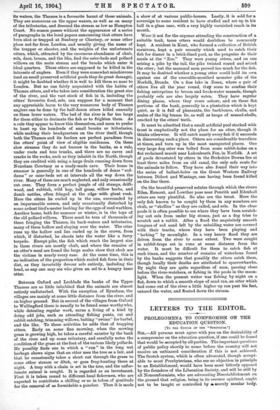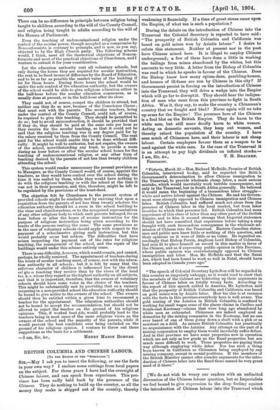Even the teaching of undenominational religion under the control of
the secular power, though accepted as a compromise by Nonconformists, is contrary to principle, and is now, as you say, objected to by the High Church party. The following scheme would, I think, meet all the theoretical objections of Noncon- formista and most of the practical objections of Churchmen, and I venture to submit it for your consideration.
Let the education authority rent all voluntary schools, but only during the hours they are required for secular instruction, the rent to be fixed incase of difference by the Board of Education, and to be as far as possible the market value of the building if let for those hours. During those hours the school would be under the sole control of the education authority, but the owners Of the school would be able to give religious education either in the half-hour before the secular education commences, as is usually done at present, or in the half-hour after its close.
They could not, of course, compel the children to attend, but neither can they do so now, because of the Conscience Clause ; that must rest with the parents. The secular teachers, being under the control of the County Council, could not, of course, be required to give this teaching. They should be permitted to do so ; but to avoid misconstruction, it should be provided that If they do, they should be paid at the same rate per hour as they receive for the secular teaching., so that it could not be said that the religious teaching was In any degree paid for by the salary received by them from the County Council. The rent paid for the school would enable this to be done without diffi- culty. It might be well to authorise, but not require, the owners of the school, notwithstanding any trust, to provide a room during an hour before or after the secular school hours for the teaching of undenominational religion, or any other form of teaching desired by the parents of not leas than twenty children attending the schooL
This system would render unnecessary the present provision as to Managers, as the County Council would, of course, appoint the teachers, as they would have control over the school during the time it was rented by them, while they would have nothing to do with the religious teaching or with the school at the time it was not in their possession, and this, therefore, might be left to be regulated by the provisions of the trust-deed.
The objection felt by Churchmen to the present system of provided schools might be similarly met by enacting that upon a requisition from the parents of not less than twenty scholars the education authority should let a room in the school building to the vicar and churchwardens, or to the recognised representatives of any other religious body to which such parents belonged, for an hour before or after the hours of secular instruction for the purpose of religious instruction being given according to the tenets of the persons renting the same. The same provisions as In the case of voluntary schools should apply with respect to the payment of a schoolmaster giving such instruction, but this would probably occur but seldom. The difficulties that have arisen respecting the payment out of the rates for religions teaching, the management of the school, and the repair of the buildings would under this scheme entirely cease.
There is one difficulty, however, which would remain, and cannot, perhaps, be wholly removed. The appointment of teachers during the hours of secular teaching must, of course, rest with the educa- tion authority in all schools ; but it is felt by many that the religious character of children is influenced less by the direct vol gio Ts teaching they receive than by the views of the head tea. h r, whom they regard as the highest authority on all subjects, and that it is important, therefore, that the owners of voluntary schools should have some voice in the choice of the teachers. This might be substantially met by providing that on a vacancy occurring in a non-provided school the education authority should be bound to give notice to the owners of the school. The owners should then be entitled within a given time to recommend a teacher for the appointment. The education authorities should not be bound to accept the recommendation, but should not be allowed to reject the teacher on the ground of his religious opinions. This, if worked bona fife, would probably lead to the teachers being in most cases of the same religious views as the owners of the school and the majority of the parents, while it would prevent the best candidate ever being excluded on the ground of his religious opinion. I venture to throw out these suggestions as the basis for a settlement.
—I am, Sir, de., HENRY MASON BOMPA£1.
BRITISH COLUMBIA AND CHINESE LABOUR.
[To roe Bones or rar “Erscraror.")
Brit,—May I ask you to insert the following, or use the facts in your own way ? I enclose some cuttings from local papers on the subject. For three years I have had the oversight of Chinese labour, and can speak from experience. This pro- vince has been sadly held back by the presence of the Chinese. They do nothing to build up the country, as all the money they make is shipped out of the country, thereby During the debate on the introduction of Chinese into the Transvaal the Colonial Secretary is reported to have said : "The prosperity of British Columbia and California was based on gold mines won by Asiatic labour.". I desire to refute this statement. Neither at present nor in the past have Chinese mined here. It is illegal to employ Chinese underground; a few of them have done a little in washing the tailings from mines abandoned by the whites, but this amounts to very little. A. letter from the Bishop of Columbia was read in which he speaks in favour of the Chinese. Does the Bishop know how many opium-dens, gambling-houses, and houses of ill-fame are run by Chinese in this city P If Government persist in forcing on the introduction of Chinese into the Transvaal, they will drive a wedge into the Empire which will go far to disruptit. They should hear the indigna- tion of men who went from this province to fight in South Africa. Was it, they say, to make the country a Chinaman's country that we fought and bled ? Never again will we take up arms for the Empire ! The presence here of the Chinese is a foul blot on the British Empire. They do harm to the white men, but still more deadly harm to white women. Acting as domestic servants, they keep out women, and thereby retard the population of the country. I have seen much of Chinamen here, and their labour is not cheap labour. Certain employers favour them as a weapon to be used against the white men. In the case of the Transvaal it is an attempt to pay high dividends on inflated stocks,.
I am, Sir, Ac., T. H. BRACKEN. Vancouver.
" Victoria, March 23.—Hon. Richard McBride, Premier of British Columbia, interviewed to-day, said he regarded the British Government's determination to allow Chinese immigration to the TOISIBIOlal, to provide wholesale cheap labor, a moat serious mistake, which would inevitably work terrible consequences, not only in the Transvaal, but in South Africa generally. He believed it would mean the beginning of a tremendous labor struggle_ white and native labour against the Chinese. He and his Govern- ment were strongly opposed to Chinese immigration and Chinese labor. British Columbia had suffered much not alone from the presence of Chinese labor in the local market, but from labor troubles to which that presence led. British Columbia had more experience of this class of labor than any other part of the British Empire, and to him it seemed strange that Imperial statesmen should not have consulted that experience before taking a step fraught with such tremendous consequence in the wholesale ad- mission of Chinese into the Transvaal. Eastern Canadian states- men and public men knew little or nothing of this question, and their opinions on it were of little or no value. He regretted ex- ceedingly that Bishop Perrin, Anglican Lord Bishop of Columbia, had seen fit to place himself on record in this matter in favor of the Chinese, and as if expressing public opinion in this Province, where public opinion was overwhelmingly opposed to Chinese immigration and labor. Hon. Mr. McBride said that the 'Natal Ant, which had been found to work so well in Natal, should have been adopted in Conoda years ago."
"The speech of Colonial Secretary Lyttelton will be regarded in this country as singularly unhappy, as it would tend to show that the members of the Cabinet are bolstering up their arguments in favour of Chinese labor on totally wrong facts. According to the report of this speech cabled to America, Mr. Lyttelton said that the prosperity of British Columbia and California was based on gold mines won by Asiatic labor. How far this is at variance with the facts in this province everybody here is well aware. The gold mining of the Asiatics in British Columbia is confined to working for small wages some of the placer claims in Cariboo and South-east Kootenay—claims that were long ago abandoned by white men as exhausted. Chinamen are indeed employed as domestics by the mining companies in the Kootenay, but no one ever heard of one of them going down a shaft with a pick eras assiatant on a drill. As miners British Columbia has practically no acquaintance with the Asiatics. Any attempt no the part of a mining corporation to employ them would inevitably suffer defeat. And in this province we have some properties now in operation which are not only as low grade as the Rand properties but are much more difficult to work. These properties are paying their way although employing white labor. Nor has such a thing been known in California as Chinamen being employed by any mining company, except in menial positions. If the members of the British Ministry cannot offer sounder arguments for the intro- duction of Chinese labor into the Rand there cannot be very great need of it there."
[We do not wish to weary our readers with an unlimited discussion of the Chinese labour gueition, but as Imperialists we feel bound to give expression to the deep feeling against the introduction of Chinese labour into the Transvaal Which







































 Previous page
Previous page